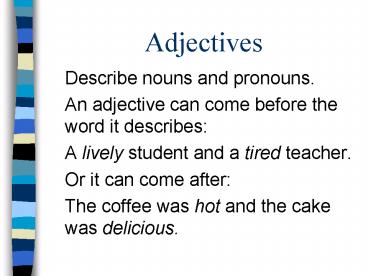Adjectives - PowerPoint PPT Presentation
1 / 20
Title: Adjectives
1
Adjectives
- Describe nouns and pronouns.
- An adjective can come before the word it
describes - A lively student and a tired teacher.
- Or it can come after
- The coffee was hot and the cake was delicious.
2
Comparatives
- To compare two nouns or pronouns
- This book is old, but that one is older.
- That woman is beautiful, but this one is more
beautiful.
3
Superlatives
- To compare three or more
- My car is old my neighbours is older, but my
husbands is the oldest. - Maths is interesting literature is more
interesting, but linguistics is the most
interesting.
4
NOTE FOR SWEDES
- The Swedish absolute comparative is unusual in
English. - En bättre middag a rather good dinner
- En mindre summa pengar a small amount of money
5
Later or latter?
- Later is the normal form.
- Is there a later bus?
- Latter is more formal and used to show order.
- The latter half of term.
6
Last or latest?
- Last refers to the final one.
- Many people believe The Tempest to be
Shakespeares last play. - Latest refers to the most recent.
- The Naming of the Dead is Ian Rankins latest
novel.
7
Modifiers
- You can put one of these before most
adjectives - very, enormously, extremely, terribly, most,
surprisingly, too, much too, unusually - fairly, rather, pretty
- a little, a bit, somewhat
8
Enough
- Note that enough comes after the adjective
- Is your coffee strong enough?
- Have I explained this well enough?
9
Fill in the missing word!
- Some Swedish phrases require an extra word in
English - Guess what Ive been doing during the past few
weeks! - Hes got his own flat in town.
- This example is much longer than the previous
one.
10
Before or after?
- Some adjectives can come before or after the
noun they refer to, but with a change in meaning.
- The present students (nuvarande)
- The students present (närvarande)
11
- The concerned parents (bekymrade)
- The parents concerned (berörda)
- The responsible teacher (ansvarskännande)
- The teacher responsible (ansvarige)
12
The good, the bad and the ugly!
- Some adjectives can be used as nouns. These
are called substantive adjectives. - In the plural, in a general sense, they refer
to everyone in a category - The unemployed demand work.
13
- In the singular, when we are specific, we have
to add a noun - The unemployed man claimed benefit.
14
- In the singular, in a general sense, we refer to
abstract phenomena - Ive always been interested in the unknown.
15
- In some phrases we have to add a word, such as
thing or part - The important thing is to do your best.
- The sad part of it is that I really liked her.
16
Some adjectives have become nouns
- These take the s plural and can have the
(in)definite article - The blacks, the whites, the reds, the Greens
- The Conservatives, the Liberals
- A drunk, a friendly, an international
17
Nationality adjectives
- Always begin with a capital letter!
- In some cases, where the connection to
nationality is not obvious, we can use small
letters - french fries, go dutch, swede, china
18
The English The Englishmen?
- In a general sense, referring to the nation, we
use the form the English - The Scots beat the English at Wembley.
19
- When we refer to specific people we use the form
the Englishmen - The Englishmen at the conference went home early.
20
Order of adjectives
- When using two or more adjectives, note the word
order - Subjective opinion size age form colour
origin material NOUN - A charming, little, old, square, red, Swedish,
wooden cottage.































